
Fledgling farmers: strengthening local food supplies – guest blog
February 26, 2021Home » Fledgling farmers: strengthening local food supplies – guest blog
The past year has highlighted the fragility of our food systems and the need to build greater resilience into supply chains. Katie Hastings of the Pathways to Farming project gives us a flavour of how local growers in and around CAT’s home town of Machynlleth have responded to the challenge.
When accepting our new intake of Pathways to Farming trainees over a year ago, we thought 2020 would be an easy year. Having already run the new training programme in commercial food production in 2019, we were ready to repeat the same thing again for new trainees wanting to progress to growing food for our wider community.
“We’ll just tweak a few things,” we said. “This year will run a lot more smoothly.” We didn’t realise we were in the calm before the storm.
Our winter classroom sessions went largely to plan. Our 10 new trainees diligently wrote business plans and planned crops to fill their training plots. We spoke about the local markets we had carefully researched for our growers to sell their produce into. We name dropped the businesses we were already working with, confident that they had a demand for the locally grown salads and fresh veg our trainees were going to provide.
And then the pandemic came, just as the spring seed sowing was kicking off.
A difficult spring
My first fear was that Pathways to Farming was going to grind to a halt as the country went into lockdown. It didn’t take long to realise that the opposite was going to be true. Food production is essential work. The Welsh Government released a list of those who could still travel, and of course food producers were on it. Something heavy settled in me. We had always known how important it would be to grow food for local consumption, and here was the moment when we might actually need to rely on that food.
We suddenly had a fresh single-minded focus. If you are going to have a crisis in the food supply chain, there is no better time for that to happen than early spring. As if the virus had given us this one small mercy, we exploded into seed sowing.
Overnight, our trainees at CAT took on double the growing space they had planned for.
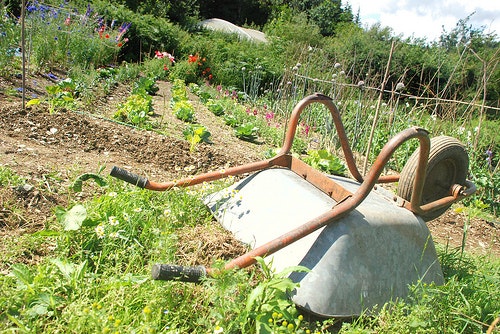
As the CAT visitor centre closed and staff were furloughed, our trainees stepped up to take on tending the fields. Leek seedlings were passed from veteran gardeners’ hands to ours. In the absence of proper planning time, simple hand-drawn sketches were emailed around late at night with new crop rotations. Clubbing together, seed potatoes were franticly ordered from nationally dwindling stocks. Evening zoom calls took place with trainees asking streams of questions to our tutor as they tried to adjust to scaling up.
In Newtown, our trainees had been gearing up to run the Veg2Table box scheme for its second year, supplying local households with fresh produce. As the pandemic set in and food distribution systems were being reordered all around them, their focus sharpened. Selling locally grown vegetables direct to local people remains one of the best models for getting food from fork to plate quickly. The pandemic only served to highlight this further. Working closely with our sister organisation Cultivate, our trainees pushed to get more crops in the ground. As Cultivate grappled to open a local food shop on the high street amidst a changing food landscape, Veg2Table was able to pack and distribute their veg boxes from this shop and straight into the hands of local people.
Organising local support
With the pandemic came important accelerations to long needed support for local food. In Machynlleth, a new community group Planna Fwyd sprang into action, organising support for local people to grow.
Several new farmers stepped forward with land, wanting to produce for the community. With no formal training, they burst into action preparing new fields for kale production, planting hundreds of kilos of potatoes and conjuring up entirely new market garden spaces from woodchip and manure.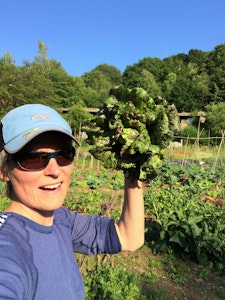
We hosted a ‘field scale support group’ which offered these new vegetable farmers a space to share challenges and ask questions of our tutor as they pushed on to working out how to get this produce to local mouths.
Planna Fwyd’s creation of a Dyfi Land Army provided additional support and gave local furloughed people a safe way to volunteer on local farms at the height of the spring rush. People willingly signed up to barrow soil, plant squash and weed. They arrived upbeat and ready to help. They provided much needed support to local vegetable farms, as well helping us to prepare more land on the CAT field.
As the season progressed, I was taken aback by what our trainees achieved. Muscles ached and faces became tired as the zoom calls pushed later into the evening to account for long days in the fields. Come June, the harvest had begun.
Food for the community
Growing food is only halfway to the summit for commercial vegetable growers. Once you have produced something tasty and nutritious, it needs to be packaged, delivered and sold. Fresh veg is highly perishable and priced cripplingly low. Our Pathways to Farming training is designed to support trainees in writing business plans to find niche markets, special business relationships and value-added processing techniques. But as 2020 unfurled, the best laid plans of our trainees were pretty much in tatters as restaurants closed, cafes cut costs, more people moved into poverty and those with the space to do so started growing their own food.
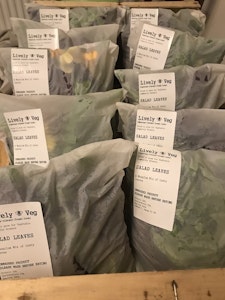 Unstoppable, our trainees packaged food and sold it through local grocery store Siop Blodyn Tatws and the Fresh and Local stall in Machynlleth market. They no longer focused on profitable crops but on those that were needed. Putting solidarity before earning a living themselves, they gave high quality vegetables to ‘Solidarity Veg Boxes’ organised for distribution to local people unable to afford fresh food (organised by Planna Fwyd and the Machynlleth Solidarity Fund).
Unstoppable, our trainees packaged food and sold it through local grocery store Siop Blodyn Tatws and the Fresh and Local stall in Machynlleth market. They no longer focused on profitable crops but on those that were needed. Putting solidarity before earning a living themselves, they gave high quality vegetables to ‘Solidarity Veg Boxes’ organised for distribution to local people unable to afford fresh food (organised by Planna Fwyd and the Machynlleth Solidarity Fund).
Meanwhile in Newtown, the Veg2Table box scheme supplied 20 households with local veg every week through the Cultivate shop, extending the box scheme throughout the winter to meet demand for fresh, local produce.
Galvanised by the new focus that lockdown provided, two of our 2019 trainees created a brand new market garden on the Cwmllywi hill farm run by the Tomos family. In partnership with Mair Tomos and Siop Blodyn Tatws, the market garden produced salads, fresh herbs, tomatoes and other crops to be sold directly through the shop, as more people turned to their local greengrocer for their weekly shopping.
Launching an online distribution hub
Building on our consultation and plans from 2019, we launched the Bwyd Dyfi Hub to help with distribution. One of the key barriers to businesses buying local produce is lack of easy communication channels with growers who are often out in the field. Using Open Food Network software, we created an online hub for multiple producers to list their fresh produce for businesses to order in one place.
With many hospitality businesses in Machynlleth operating at reduced capacity, we immediately expanded our delivery bubble to cover a wider area. Not only did this fill an immediate gap for produce needing an outlet, it also strengthened our relationship with allies geographically further afield. These relationships are already sowing the seeds for a new expanded food hub to run next year across the Dyfi Biosphere, taking more produce from market gardens to residential centres like Aberystwyth.
Building resilience
Finally able to take a breath, I can’t quite do justice to what has been achieved this year by our fledgling farmers. Unflinching in the face of so much change, our trainees and community growers have exemplified the attitude that I find again and again in local food producers: determination, resilience and fierce passion for growing good food for people to eat.
If there is anything we can take away from 2020 it is that we cannot rely on our food being imported from elsewhere and grown by people with whom we have no connection. We need a resilient local food system that supports local growers. We need people in our community to buy local food consistently and at a price which better reflects the costs of sustainable production. We need distribution systems that address food justice, making good food accessible to all. We need to show up for our growers, in the fields, with our purses and on our plates.
Let’s raise a glass to the 2020 Pathways to Farming trainees and all they have achieved…
Nature’s Basket
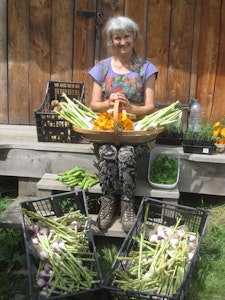 Claire (pictured) and Emma Rhydwen produced food on three different sites last year while furloughed from their jobs. Hauling in 31 types of vegetables, they delivered all their produce by bicycle to Machynlleth. Selling through Siop Blodyn Tatws and the Fresh & Local stall, they made significant contribution to the local food economy. Their produce also went into the Solidarity Veg Boxes to feed the community most in need. Look out for their Agretti and other crops into 2021.
Claire (pictured) and Emma Rhydwen produced food on three different sites last year while furloughed from their jobs. Hauling in 31 types of vegetables, they delivered all their produce by bicycle to Machynlleth. Selling through Siop Blodyn Tatws and the Fresh & Local stall, they made significant contribution to the local food economy. Their produce also went into the Solidarity Veg Boxes to feed the community most in need. Look out for their Agretti and other crops into 2021.
RealRoots
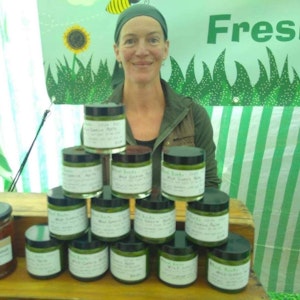 Kait Leonard is enjoying her second year of growing at CAT, and is producing fresh foods, herbs, foraged goods and natural skin products. She had particular success in the field with beans, potatoes and squash, as well as caring for CAT gardeners Roger’s garlic crop. She has also been expanding her exciting indoor microgreen and salad production, trialling a new hydroponic unit as part of a skill-sharing group of vertical farmers in North Wales. Kait will continue increasing production into 2021, selling her produce on the Fresh & Local stall and in Siop Blodyn Tatws.
Kait Leonard is enjoying her second year of growing at CAT, and is producing fresh foods, herbs, foraged goods and natural skin products. She had particular success in the field with beans, potatoes and squash, as well as caring for CAT gardeners Roger’s garlic crop. She has also been expanding her exciting indoor microgreen and salad production, trialling a new hydroponic unit as part of a skill-sharing group of vertical farmers in North Wales. Kait will continue increasing production into 2021, selling her produce on the Fresh & Local stall and in Siop Blodyn Tatws.
Enfys Veg
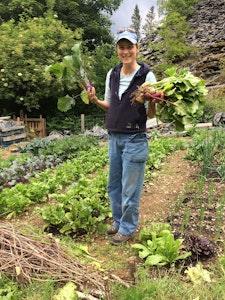 Ruth Kernohan executed some precision crop planning using veg planning software, only to have to double her production and adjust the entire plan as the pandemic kicked off. Ruth’s sales highlights were her kohl rabi, spinach, beetroot, spring onion and sweetcorn. She packed these products with minimal plastic, providing direct to Siop Blodyn Tatws, as well as through the Food Hub and some much-needed crops to the Solidarity Veg Boxes. She also grew and dried fruits of the luffa sponge, with great body scrubbing success.
Ruth Kernohan executed some precision crop planning using veg planning software, only to have to double her production and adjust the entire plan as the pandemic kicked off. Ruth’s sales highlights were her kohl rabi, spinach, beetroot, spring onion and sweetcorn. She packed these products with minimal plastic, providing direct to Siop Blodyn Tatws, as well as through the Food Hub and some much-needed crops to the Solidarity Veg Boxes. She also grew and dried fruits of the luffa sponge, with great body scrubbing success.
Cwmllywi
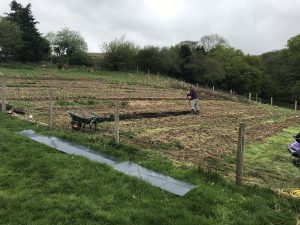
Three of our trainees have set up an exciting venture on the Cwmllywi hill farm in Abercegir. Mair Tomos, Sadie Maund and Gareth Fysh-Foskett have worked together to build new infrastructure and vegetable beds. Most of the freshly picked produce goes directly into Mair’s high street shop Siop Blodyn Tatws, as well as into Solidarity Veg Boxes for local people to eat. In addition, Sadie is distributing her high quality salads to other outlets, packed with edible flowers, via her Dwylo Da business.
Lisa Sture
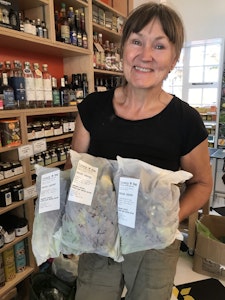 Lisa took on the task of cooperatively managing the Veg2Table box scheme, in partnership with Cultivate. Bringing her experience in the food business, she produced, packed and distributed a wide range of fresh produce to the 20+ households signed up to receive weekly local veg. Particular successes were in baby lettuce, watercress, microgreens and tomatoes. Determined not to add to the sea of single use plastic, mesclun lettuce and microgreens were packed in home compostable bags and other crops in paper bags.
Lisa took on the task of cooperatively managing the Veg2Table box scheme, in partnership with Cultivate. Bringing her experience in the food business, she produced, packed and distributed a wide range of fresh produce to the 20+ households signed up to receive weekly local veg. Particular successes were in baby lettuce, watercress, microgreens and tomatoes. Determined not to add to the sea of single use plastic, mesclun lettuce and microgreens were packed in home compostable bags and other crops in paper bags.
Lisa is looking for permanent growing space and continues to develop her longer-term business plans to sell microgreens and other unique products. Lisa specialises in chilli plants to sell to Cultivate Deli customers, as well as perfecting her chilli vodka.
Ian Davies
Ian took on significant areas of the produce field at CAT, nurturing CAT gardener Roger’s kale and tomato crops, as well as planting his own. Ian provided impressively large leaf crops to the Solidarity Veg Boxes to be enjoyed by people who wouldn’t otherwise have access to fresh food. Ian’s food made it into Siop Blodyn Tatws on the Machynlleth high street. He also fed his seven-person strong household with high quality food, reducing their need to buy imported vegetables.
Pete Stewart and Ali Murfitt
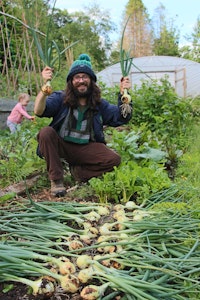 Juggling work and childcare, Pete (pictured) and Ali produced some of the first sellable crops this year in the form of huge onions. They also cultivated herbs for processing into value-added produce.
Juggling work and childcare, Pete (pictured) and Ali produced some of the first sellable crops this year in the form of huge onions. They also cultivated herbs for processing into value-added produce.
Heather Garett
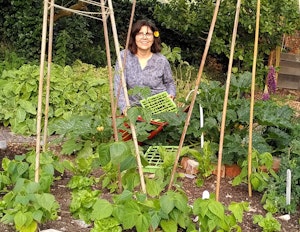 Heather had plans to produce food for distribution for people in her home town of Tywyn. Suddenly faced with the need to shield throughout the pandemic, she shifted her energy to building up a totally self-sufficient garden for her family. Producing a wide range of crops throughout the season, she gained a great deal of pleasure from picking their dinner fresh from the garden and not needing to rely on supermarket deliveries. She also managed to sell some produce to neighbours at her farm gate.
Heather had plans to produce food for distribution for people in her home town of Tywyn. Suddenly faced with the need to shield throughout the pandemic, she shifted her energy to building up a totally self-sufficient garden for her family. Producing a wide range of crops throughout the season, she gained a great deal of pleasure from picking their dinner fresh from the garden and not needing to rely on supermarket deliveries. She also managed to sell some produce to neighbours at her farm gate.
Maxwell Woodford, Coedcae Farm
Moving into his second year in the Pathways to Farming programme, Maxwell set about preparing land on his family’s new smallholding. Building a handcrafted greenhouse and establishing no dig mulch beds, Maxwell continued to supply the Veg2Table box scheme with food, concentrating on tasty new potatoes.
Michelle Watkins
As one of the founding members of Veg2Table box scheme, Michelle continued to cultivate crops in the Cultivate Community Garden in 2020. She supported the box scheme to go from strength to strength with organisation and distribution work, as well as producing some high quality crops.
Tara Barnett
Tara focused her energy on setting up growing infrastructure on her farm, creating raised beds and covered cropping space. She focused on unusual varieties, producing purple peas and vibrant red lettuce leaves. Tara delivered food to other people in her village, a much-needed service in the absence of a village shop.
About the author
Katie Hastings is joint Project Coordinator for Pathways to Farming and co-founder of Mach Maethlon. She has been growing vegetables for more than 10 years, including six months volunteering in the CAT gardens.
For more info on Pathways to Farming and Mach Maethlon: www.machmaethlon.org, katie@machmaethlon.org
Pathways to Farming is run by Mach Maethlon in partnership with CAT and Cultivate, and is funded by Arwain Rural Development Fund, part of the European Social Fund. For more information, see www.machmaethlon.org

- Climate Change
- Food
- Gardening and Agriculture
- Nature and Wildlife
- News Feed
Related Topics
Related Pages
Related news


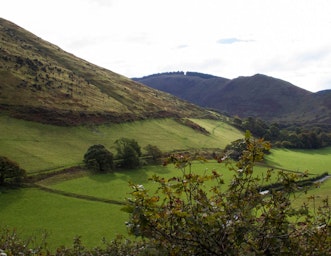
CAT Conversations: Sandy Stevens, CAT graduate
17th April 2025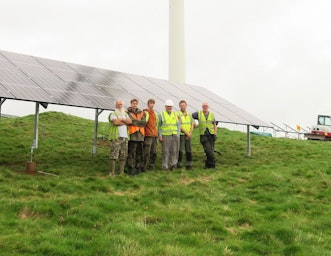
More solar energy for CAT
4th April 2025Email sign up
Keep up to date with all the latest activities, events and online resources by signing up to our emails and following us on social media. And if you'd like to get involved and support our work, we'd love to welcome you as a CAT member.
